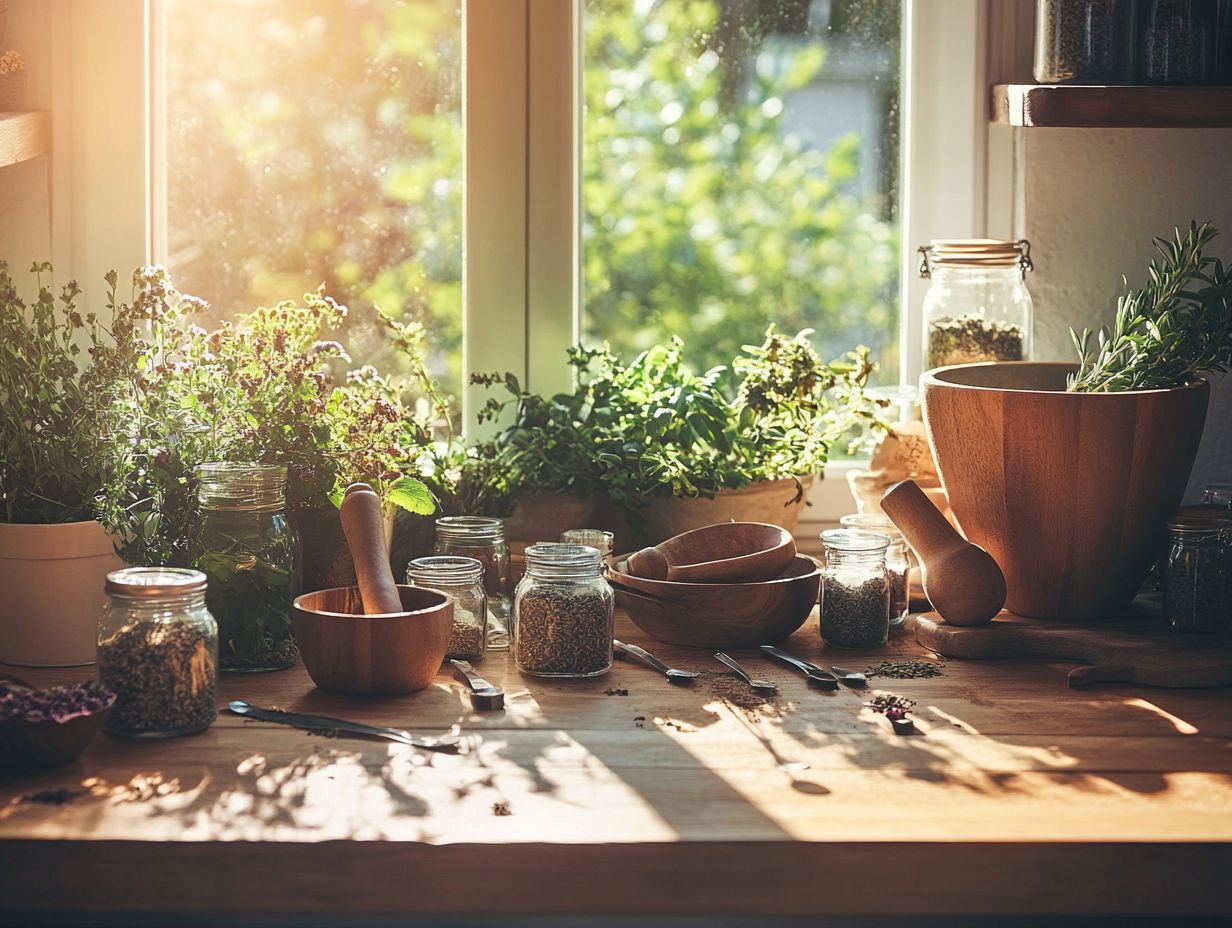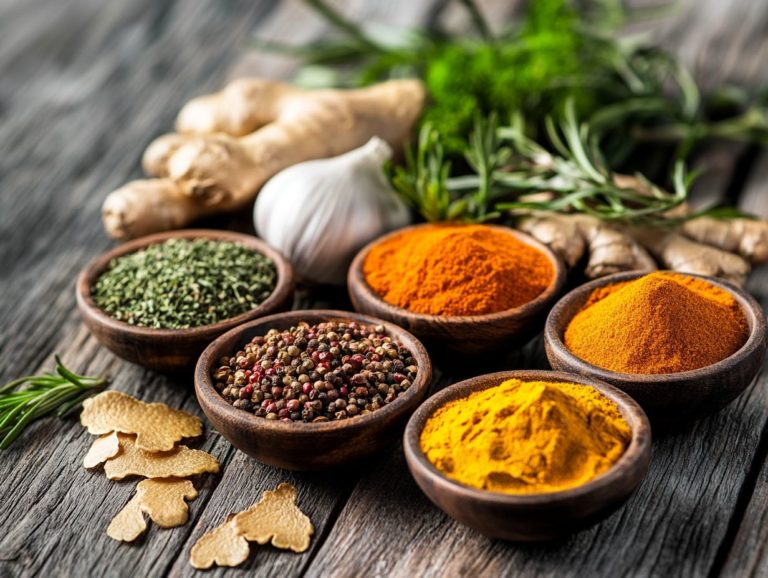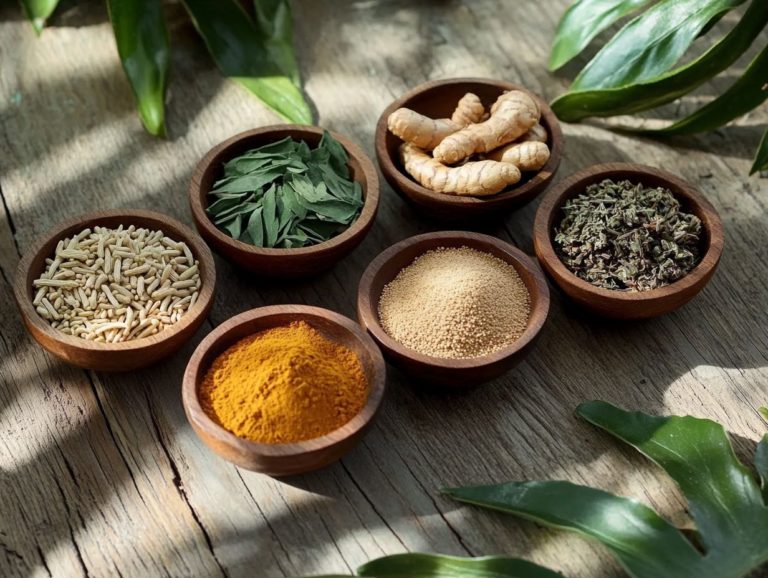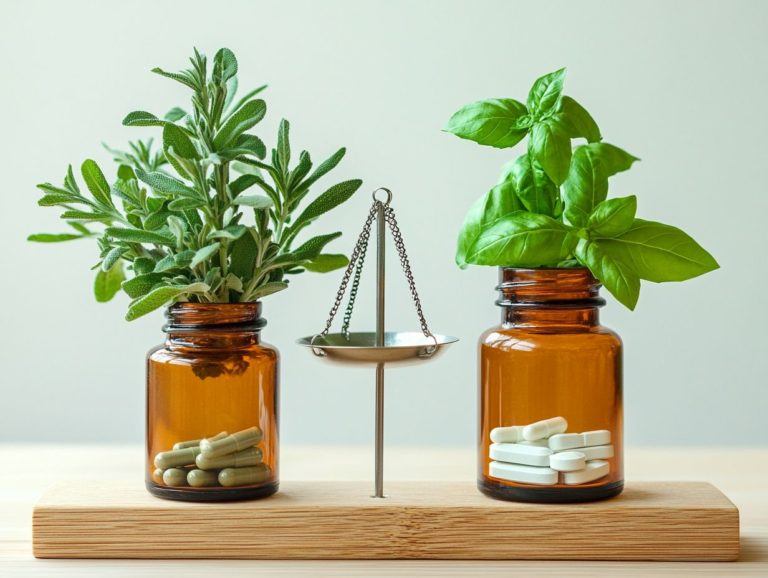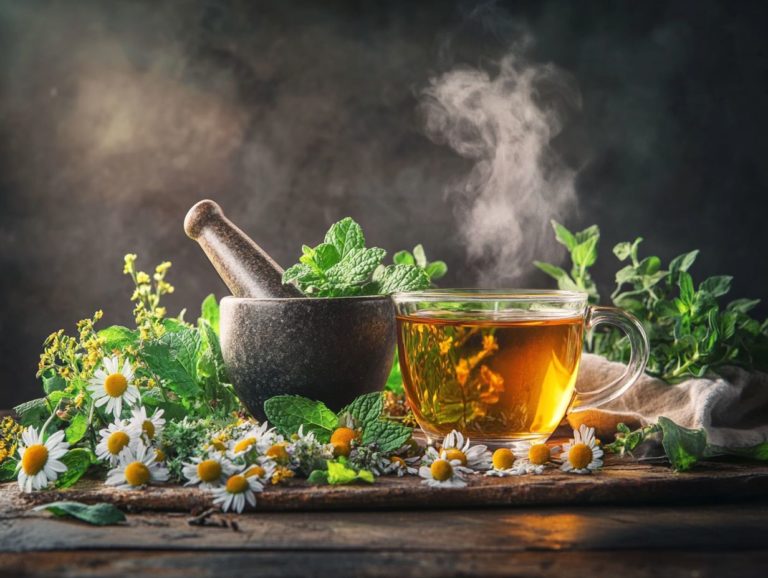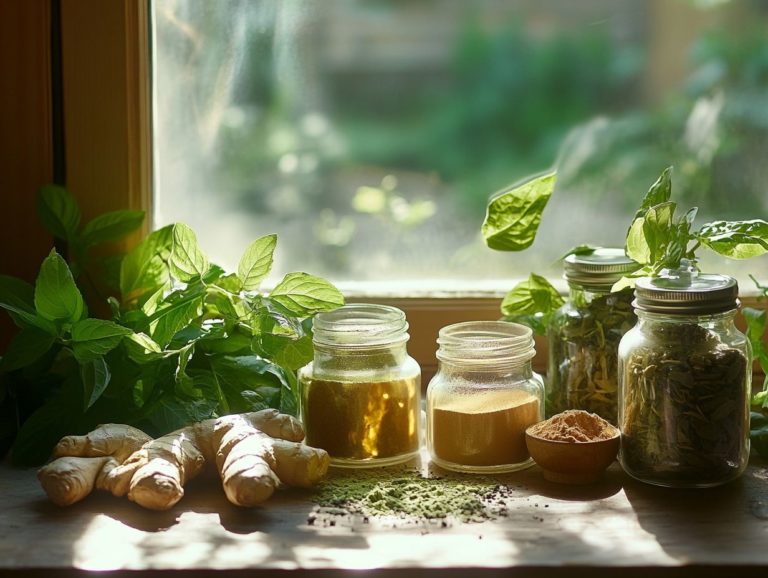How to Prepare Herbal Remedies at Home
Herbal remedies have been cherished for ages, providing a natural alternative to conventional medicine.
Dive into the benefits of these time-honored practices, exploring their healing properties and the most common herbs you can easily incorporate into your home remedies.
Discover how to prepare these remedies while understanding essential safety precautions to keep in mind.
Finally, uncover tips on integrating herbal solutions into your daily routine, paving the way for a healthier lifestyle.
Contents
- Key Takeaways:
- Benefits of Using Herbal Remedies
- Common Herbs for Home Remedies
- How to Prepare Herbal Remedies at Home
- Caution and Safety Measures
- Incorporating Herbal Remedies into Daily Life
- Frequently Asked Questions
- What are herbal remedies and why should I prepare them at home?
- What are some common herbs used in herbal remedies?
- How do I prepare herbal remedies at home?
- Are there any precautions I should take when preparing herbal remedies at home?
- Can I use herbal remedies in place of traditional medicine?
- How Should Herbal Remedies Be Stored?
Key Takeaways:
Discover how easy it is to prepare herbal remedies at home and unlock their healing powers! Stay safe by following precautions and incorporating these remedies into your daily routine. Popular herbs such as ginger, chamomile, and turmeric can be used for various home remedies.
What are Herbal Remedies?
Herbal remedies, a branch of herbal medicine, include various natural treatments made from plants that help with health, aimed at promoting wellness and preventing disease. These remedies have a rich history, integral to traditional healing practices since ancient times.
Preparation methods vary widely; two popular forms include:
- Herbal tinctures, created through alcohol extraction.
- Herbal teas, brewed to draw out beneficial compounds in water.
While these remedies are rooted in nature, it s important to ensure they are safe and effective. Regulatory bodies like the FDA and NIH MedlinePlus stress the importance of informed usage, as some herbs may interact with medications or have side effects.
Thus, conducting thorough research and consulting with a qualified herbalist or healthcare provider is essential before adding any herbal supplements to your regimen.
Benefits of Using Herbal Remedies
The benefits of using herbal remedies are extensive, offering a natural approach to health that beautifully complements conventional medicine and enhances overall wellness.
Many herbal supplements boast unique health advantages, from boosting mental clarity to supporting immune function and even preventing chronic diseases.
Take herbs like Echinacea and Lavender; they re celebrated for their therapeutic properties and can significantly enhance your quality of life when used correctly.
However, remain discerning about herbal claims and educate yourself on the potential interactions between herbal remedies and other medications.
Natural Healing Properties
The natural healing properties of herbal remedies arise from the active compounds in medicinal plants. These compounds offer health benefits, including antioxidant, anti-inflammatory, and antimicrobial effects, making them attractive options for those exploring alternative health solutions.
Always remember: “natural” doesn’t mean “safe” be cautious! Many herbs can interact with medications or cause side effects if misused. Therefore, understanding herbal interactions and consulting with a healthcare professional is essential for safe and effective usage.
For example, chamomile contains apigenin, which supports digestive health by relaxing the muscles in your intestines. Conversely, rosemary is rich in rosmarinic acid, a compound linked to enhanced cognitive function and memory support.
While these herbs provide impressive benefits, be aware of their potential side effects. Overindulging in chamomile might trigger allergic reactions in some individuals, while excessive rosemary could lead to gastrointestinal discomfort.
Thus, having a well-rounded understanding and exercising caution with these natural compounds are key to achieving optimal wellness.
Common Herbs for Home Remedies
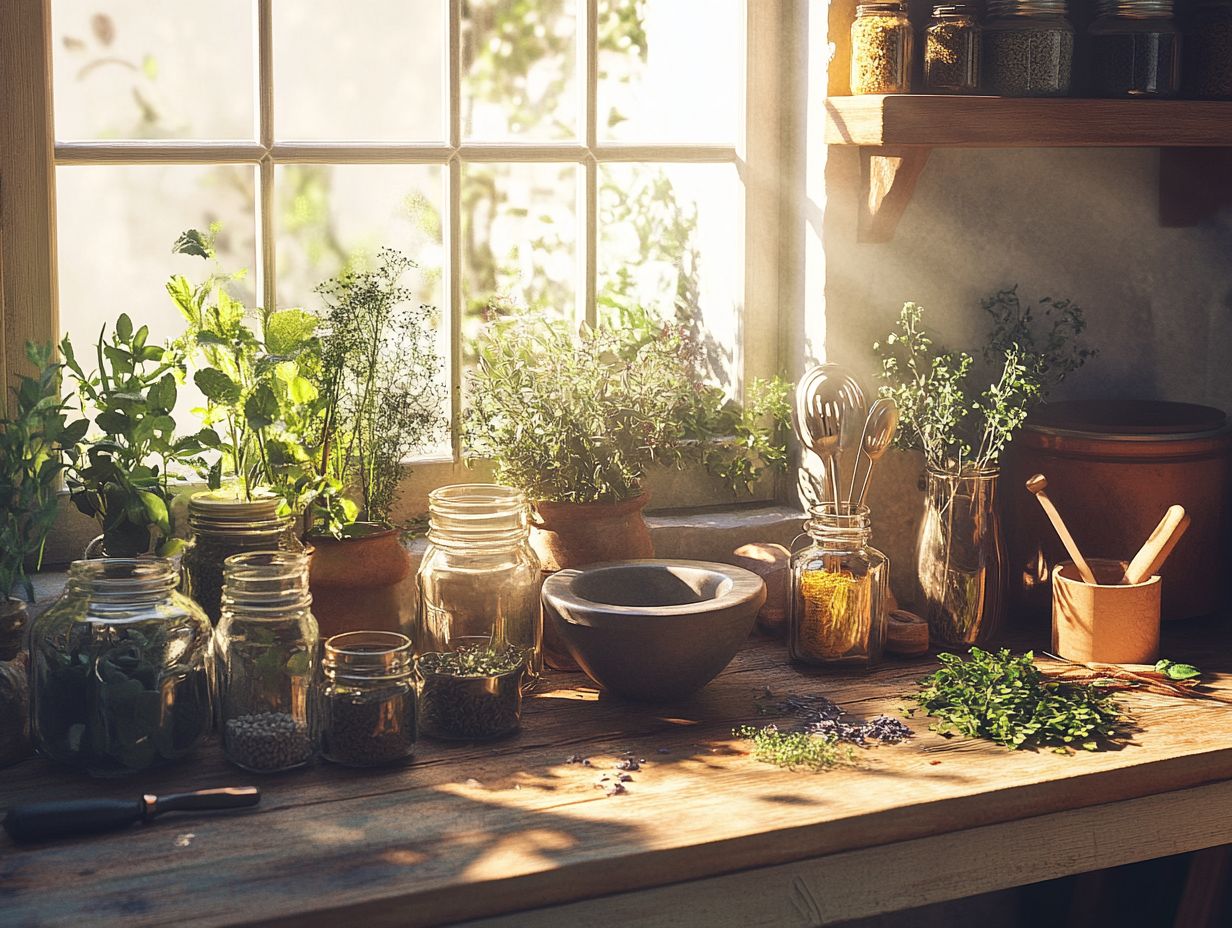
Common herbs for home remedies are a great way to use the power of nature to boost your health and well-being.
Think of Peppermint, Lavender, and Calendula these favorites are often made into herbal teas or tinctures, each offering therapeutic benefits that range from soothing digestive discomfort to alleviating stress and anxiety.
You can also cultivate your own herbs at home, which transforms into a fulfilling endeavor, allowing you to create a personal herbal medicine garden. This ensures that your remedies are not only fresh but also of the highest quality.
Start exploring herbal remedies today and take control of your health!
Popular Herbs and Their Uses
Popular herbs like Echinacea, Lavender, and Chamomile possess unique properties that make them particularly valuable as herbal remedies.
Echinacea, in particular, has caught your attention thanks to various studies showing its ability to boost immune function and shorten the duration of respiratory infections. This makes it a go-to choice, especially during the cold season.
Meanwhile, Lavender has a well-earned reputation for its calming effects. Research indicates that its essential oil can lower cortisol levels, the stress hormone, promoting a deeper, more restful sleep.
Chamomile, not to be overlooked, boasts a rich history dating back to ancient civilizations. It has served as a remedy for digestive issues and anxiety. Its gentle sedative effects have been validated by numerous clinical studies, solidifying its role in herbal preparations and traditional remedies.
These therapeutic properties emphasize the significance of incorporating these herbs into your daily wellness routine.
How to Prepare Herbal Remedies at Home
Preparing herbal remedies at home enables you to take charge of your health using natural ingredients that are often right at your fingertips. To learn more about the different techniques, check out resources on how to prepare herbal remedies at home, including making herbal teas, liquid extracts, and oils.
Each technique preserves the plant’s beneficial ingredients in its own unique way. For example, you can create herbal teas by steeping dried or fresh leaves, flowers, or roots in hot water. Liquid extracts are made by soaking herbs in alcohol or vinegar to extract their benefits over several weeks.
If you want, you can grow your own herbs. This way, you can have fresh ingredients whenever you need them.
Methods and Techniques
Methods and techniques for preparing herbal remedies offer a diverse array of options for you to explore the benefits of herbal medicine. Whether you’re crafting herbal liquid extracts or creating soothing herbal teas by steeping dried herbs in boiling water, each approach has its unique advantages and characteristics.
To truly maximize the wellness advantages of these remedies, it’s crucial to ensure the quality of the ingredients you use. Factors like growing conditions and harvesting methods can significantly impact their efficacy.
When you choose between infusions and decoctions, you’re selecting different extraction levels. Infusions are made by soaking plant materials in hot water, while decoctions involve boiling tougher plant parts for a stronger extraction.
Alternatively, oil infusions gently capture the essence of herbs, making them perfect for topical applications. However, they may require a bit more time to prepare. Each preparation method not only influences the potency of the remedy but also its effectiveness for various ailments.
This highlights the importance of selecting high-quality herbs to preserve the full spectrum of beneficial properties inherent in these natural remedies.
Caution and Safety Measures
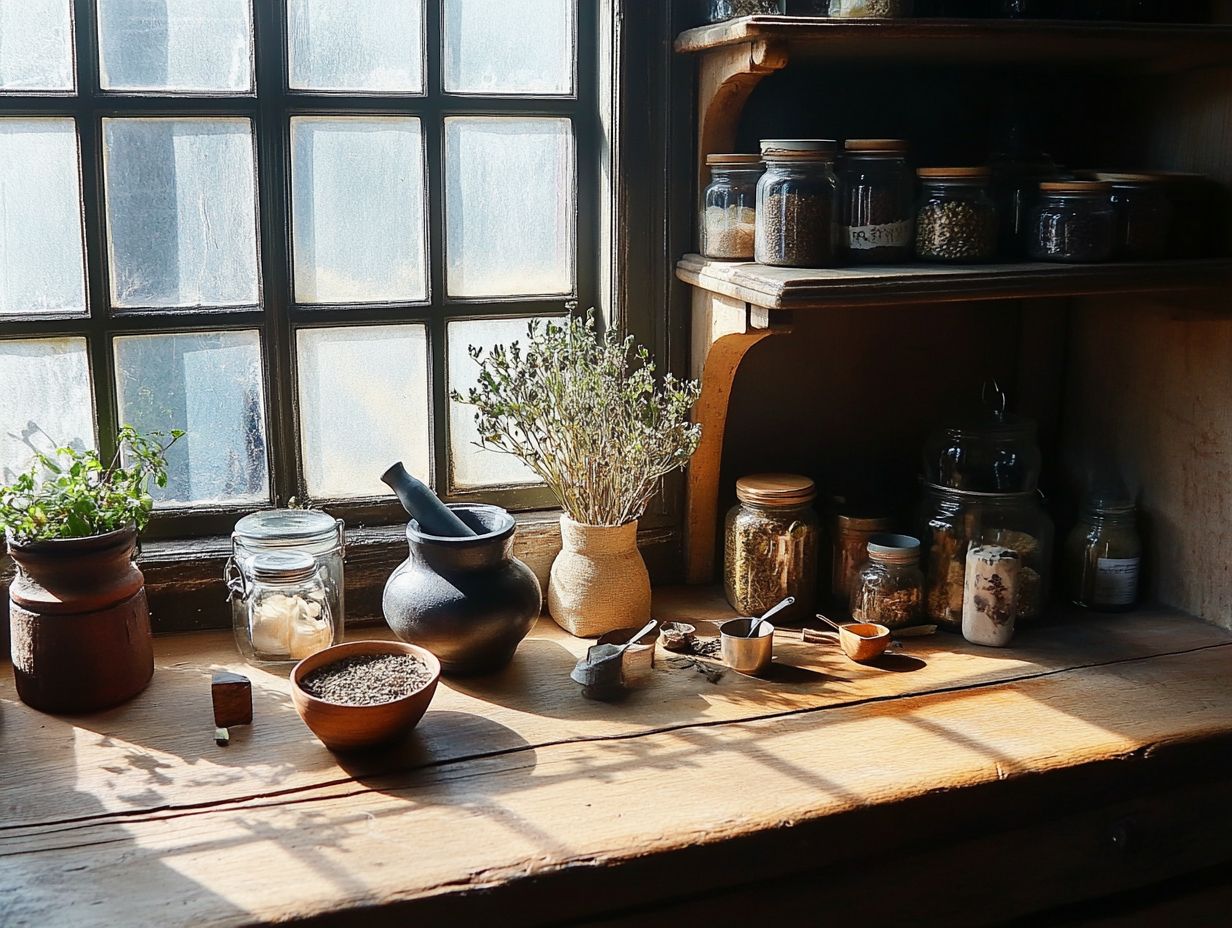
Many people mistakenly think that just because something is natural, it s safe. Caution and safety measures are paramount when exploring herbal remedies.
Herbal remedies can interact with medications, potentially resulting in serious side effects, particularly for those with existing health conditions or individuals managing multiple prescriptions.
Before you dive into herbal remedies, make sure you know the risks. Consulting with a healthcare professional can protect your health!
By understanding the potential side effects associated with various herbs, you can adopt a more informed and safer approach to herbal medicine.
Precautions to Take When Using Herbal Remedies
Taking precautions when using herbal remedies is crucial to avoid potential risks associated with their use. It s very important to recognize that not all herbs are safe for everyone; some might provoke allergic reactions or interact negatively with medications you re already taking.
For instance, popular herbs like St. John’s Wort can significantly affect antidepressants, potentially leading to increased side effects you definitely want to avoid. According to the NIH, if you have certain health conditions, such as liver disease or diabetes, it s very important to exercise extreme caution when exploring various herbal preparations.
Understanding the proper dosages and methods of preparation can greatly influence the results you get from using herbs. Consulting healthcare professionals and accessing reputable databases, like the Natural Medicines Comprehensive Database, can enable you to navigate the complex world of herbal treatments more effectively, ultimately fostering a safer approach to your health and wellness journey.
Incorporating Herbal Remedies into Daily Life
Incorporating herbal remedies into your daily life can significantly enhance your overall well-being and foster a more holistic approach to health. By acknowledging the potential of herbal supplements as valuable dietary aids, you can craft a routine that features herbal teas, tinctures, and various natural remedies specifically aligned with your health aspirations.
This thoughtful integration not only champions the benefits of herbal health but also nurtures mindfulness in your health choices. It paves the way for a balanced lifestyle that embraces natural remedies as an integral part of a comprehensive wellness strategy.
Tips for Making Herbal Remedies Part of Your Routine
Incorporating herbal remedies into your daily routine is a fun and rewarding journey that elevates your overall health. By dedicating just a few moments each day to crafting these natural concoctions, you can cultivate a deeper connection to your health journey.
For instance, blending fresh mint leaves into your water not only revitalizes your hydration but also fills your day with a refreshing aroma. Exploring herbal infusions like ginger and lemongrass tea offers delightful support for digestion.
As you delve into these practices, you might discover that keeping a record of your experiences enhances your motivation and provides valuable insights into which herbs resonate best with your unique lifestyle.
Frequently Asked Questions
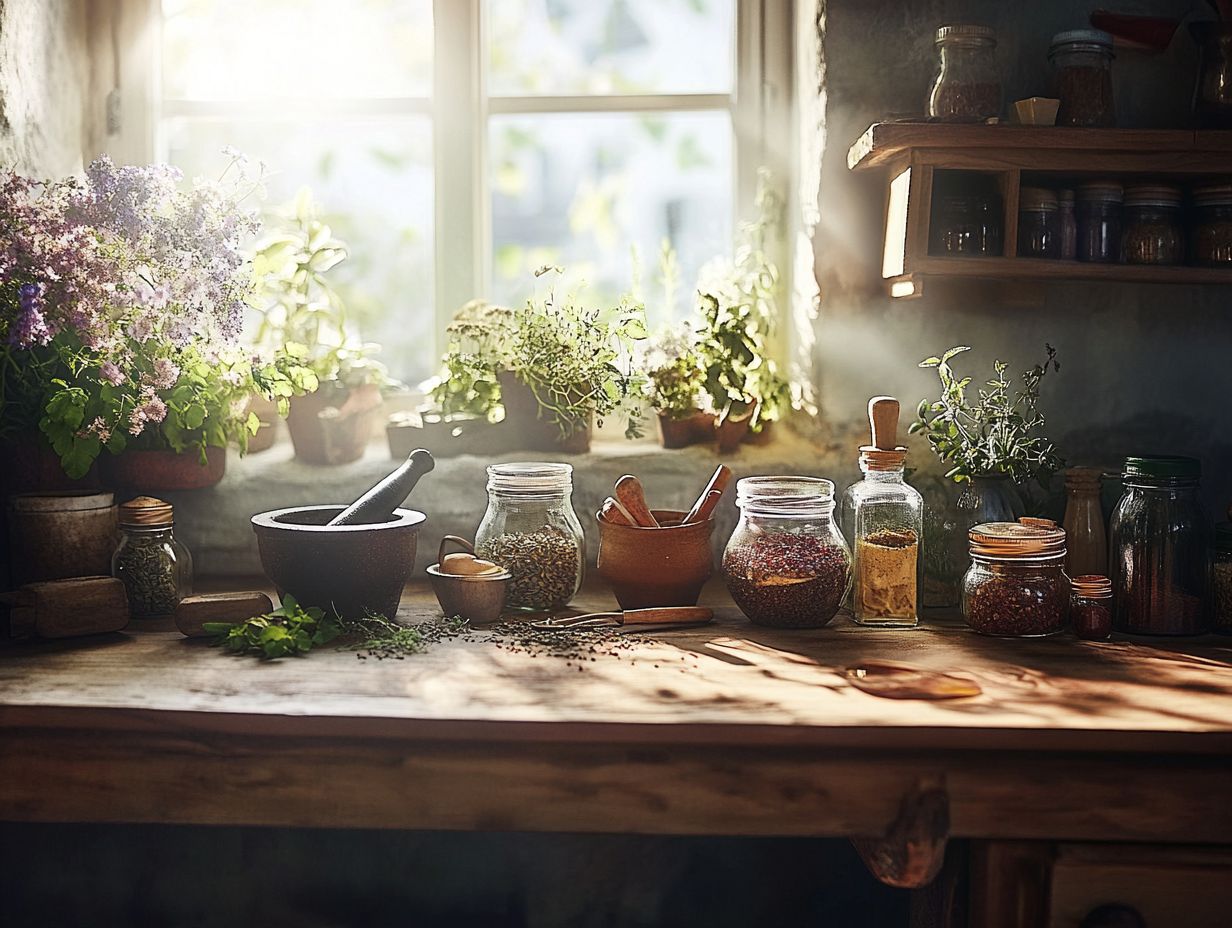
What are herbal remedies and why should I prepare them at home?
Herbal remedies are natural treatments made from plants, herbs, and other natural ingredients. Preparing them at home gives you control over the ingredients used and allows you to customize the remedies to your specific needs.
What are some common herbs used in herbal remedies?
Some common herbs used in herbal remedies include ginger, garlic, peppermint, chamomile, turmeric, and echinacea. However, there are many other herbs with medicinal properties that can be used in herbal remedies.
How do I prepare herbal remedies at home?
The preparation process for herbal remedies may vary depending on the specific remedy but generally involves steeping or boiling the herbs in water, straining the mixture, and consuming the resulting liquid or creating a topical treatment (applying the mixture directly to the skin). However, it’s crucial to understand how to safely use herbal remedies. You can find specific recipes and instructions for different herbal remedies online or in books.
Are there any precautions I should take when preparing herbal remedies at home?
Yes, it is important to research the potential side effects and interactions of any herbs you plan to use in your remedies. Some herbs may interact with medications or have adverse effects for certain individuals. It is also important to properly measure and label your herbal remedies to avoid accidentally consuming too much.
Can I use herbal remedies in place of traditional medicine?
No, herbal remedies should not be used as a replacement for traditional medicine without consulting a healthcare professional. While they can be effective for certain ailments, they should not be used to treat serious or chronic conditions without proper medical guidance.
Start your herbal journey today!
How Should Herbal Remedies Be Stored?
Herbal remedies should be kept in a cool, dry place to maintain their strength. For dried herbs, using containers that keep air out helps preserve their healing properties.
If you have fresh herbs, use them within a few days. Otherwise, make sure to preserve them properly for longer storage!

